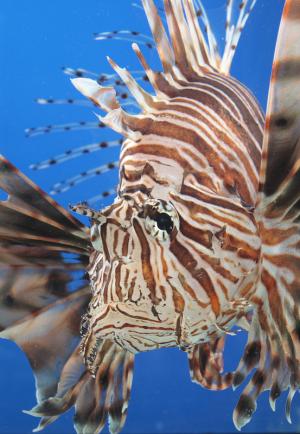Lionfish come roaring up the coast
Don't let the beautiful colors and feathery spikes of the lionfish fool you.
The tropical fish, unknown in Atlantic and Caribbean waters until the 1980s, are wreaking havoc on coral reefs in tropical waters by eating the small fish that eat algae off the reefs and help keep the reefs healthy.
Now, the fish have expanded northward and have been spotted off the Delaware coast.
Mark Moline, director of oceanography for the University of Delaware School of Marine Science and Policy, says the predatory fish, once indigenous to the Pacific, were first released in Atlantic waters in 1986 from a Florida aquarium. More made their way to Biscayne Bay after Hurricane Andrew blew through Florida in 1992.
"It just takes a small accident like this," Moline said.
Since the initial introduction of lionfish to Atlantic waters, the fish have exploded throughout the Caribbean and off the Florida shores. Lionfish spawn 30,000 eggs a week; in the Pacific natural predators help suppress the population by eating juvenile lionfish.
In particular, Southeast Asia has a number of fish that prey upon lionfish.
"If you see a lionfish there, it's rare. Natural predators are there to keep the numbers down," he said.
In the Caribbean, however, lionfish numbers have exploded, and they have taken a toll on the natural reefs that lie underneath the waters.
"Lionfish eat the herbivores that eat the algae off the reefs," Moline said. "This is a classic predator story."
Without the fish that help keep the coral reefs clean, he said, many reefs in the Caribbean have started to die.
In January, the University of Delaware began a study abroad program on the Caymen Islands focusing on coral reef environments. Moline said damage by lionfish to reefs off the Caymen coast is shocking. So far, he said, lionfish have destroyed one of the Caymen reefs.
"They're basically eating everything," he said. "We're trying to establish an argument that culling is needed."
The fish have become such a nuisance off the Florida coast that officials there recently approved lionfish fishing with no limits and without the need of a license.
In order to cull, or thin out, the lionfish population, Moline said, divers use a spear and place the fish in a bag, making sure they don't come in contact with the venomous spikes.
Bagged fish have ended up in a variety of seafood dishes.
If you can't beat 'em, eat 'em
Some Florida and Caribbean groups have started a movement to put more lionfish dishes on the table.
"The fish is very good," said Moline, who enjoyed lionfish tacos when he was at the Cayman Islands. The fish have to be specially cleaned because of their toxic spikes, but they can be included in a variety of fish dishes.
The "Lionfish Cookbook," written by the Reef Environmental Education Foundation, includes 45 recipes for cooking lionfish.
"That lionfish are delicious table fare with a delicate buttery flavor may be our best hope for helping to remove the fish and minimize its impacts," write authors Tricia Ferguson and Lad Akins in a synopsis of the book. "As Bermuda has so aptly coined, we need to 'Eat 'em to beat 'em'!"
However, the Food and Drug Administration issued a warning in March raising concern over potential toxins in lionfish, among other reef fish. Ciguatoxins accumulate in reef- dwelling fish that eat toxic marine algae or eat fish that eat the algae, according to the FDA warning. The concentration of toxins from them rises in bigger fish, which are able to consume more of the toxin.
The FDA warned fisherman to be aware of the toxin risk and refrain from selling fish harvested in areas where the toxins exist.
"This toxin is associated with fish caught in certain locations, and the toxin is heat-stable and cannot be destroyed by cooking," said Ken Gall, seafood specialist with New York Sea Grant.
Ciguatera fish poisoning is the most frequently reported seafood-toxin illness in the world, according to the Center for Disease Control. Symptoms include nausea, vomiting, and neurologic symptoms such as tingling fingers or toes. People suffering from the illness also may find that cold things feel hot and hot things feel cold.
"Ciguatera has no cure. Symptoms usually go away in days or weeks but can last for years. People who have ciguatera can be treated for their symptoms," the CDC states.
Gall said lionfish caught off the Delaware coast probably have no toxin or contain very low levels, but conditions could change.
"It would be difficult to be sure that fish will be toxin-free from any given area at any specific time," he said.
Doris Hicks, a seafood specialist with Delaware Sea Grant, said she is not aware that anyone has caught lionfish off the Delaware coast, but knows of some North Carolina restaurants that serve lionfish on the menu.
"The FDA and National Marine Fisheries Service have been working together to test the more locally caught lionfish for ciguatera and have found them to be safe," she said. "But the FDA guidelines recommend that buyers know where they come from in case they come from areas known to have ciguatera-containing algae on the reefs where they are also invasive."
Hicks said algae that contain ciguatera grow in tropical and subtropical waters and not around here.
"The environment that they live in just does not happen on the artificial reefs in our area," she said.
Delaware divers beware
Although there are no natural reefs along the Mid-Atlantic seaboard, lionfish have migrated as far as New England. They die off when water temperatures drop to 10 degrees but return each year, Moline said.
"They ride the warm water up the coast," he said.
Moline said swimmers along the shoreline should not worry about lionfish since the fish stay off the shore, but offshore divers should be wary of them since lionfish spikes can cause a severe sting.
"People have been stung, and divers have seen them on the reefs off the Delaware coast," he said. "The sting is like a bad wasp sting."
Other than the uncomfortable stings lionfish can wield, Moline said, the fish should not have much impact on local sea life. They could eat small crabs, but, he said, it is unlikely they would migrate into the bay.
Still, keeping the lionfish from destroying coral reefs in the Caribbean is a top concern for Moline and other sea experts like him. He said he worries that waiting for empirical studies to prove lionfish are destroying coral reefs could be too late to save the reefs.
"Looking forward, we're not going to get rid of these things; we're trying to find ways to use the fish," Moline said.
Melissa Steele is a staff writer covering the state Legislature, government and police. Her newspaper career spans more than 30 years and includes working for the Delaware State News, Burlington County Times, The News Journal, Dover Post and Milford Beacon before coming to the Cape Gazette in 2012. Her work has received numerous awards, most notably a Pulitzer Prize-adjudicated investigative piece, and a runner-up for the MDDC James S. Keat Freedom of Information Award.























































